It’s Time for Optimism and Leadership
January 10th, 2014 // 10:00 am @ Oliver DeMille
It’s time for optimism in America. Right now.
I’m convinced that the best era of America is still ahead. And it’s time to start building it, even if Washington won’t, and even if the politicians are going to bring us both ups and downs in the years ahead.
When we turn on the news, we hear of debts ceilings, a $17 trillion national debt, deficits, credit rating downgrades, inflationary money, layoffs, political party anger and name-calling, leaders who won’t negotiate, government shutdowns, sequesters, defaults, international unrest and conflicts, and on and on.
It’s a bit overwhelming, and most people are either deeply frustrated or have decided not to follow the news too closely.
But this is only part of the story.
While those in Washington argue, over and over, about their latest Crisis of the Month, a lot of regular citizens have done something very important. They’ve realized that the future is up to them, and not to the politicians.
And the numbers of such people are growing. Some are getting more involved than ever before at the local level, and others are spending more time strengthening their families. Some are studying current events with real passion, and others are tackling history and the great classics in order to learn a lot more.
Still others are focusing on community projects, service, teaching the youth, and supporting charities that really need more support, and quite a few are increasing their entrepreneurship — building the economy for themselves and others instead of waiting for politicians to get their act together.
And make no mistake, when the regular people in America, Canada, and other nations realize that it’s up to them and then take action, it’s like rousing a sleeping giant. When the average citizen stands up and gets involved, like after Pearl Harbor or during the American Revolution, big things really happen.
Right now, the giant is just starting to stir. The signs are faint, but they are growing: Tea Partiers, Occupiers, protestors, bloggers, radio-show callers, “social medi-ers,” and above all, lots of newly-focused volunteers and entrepreneurs.
The people are beginning to feel the need to take their nation back, especially their economy. The future is bright.
Whatever Washington does, the leadership spirit in our homes will determine the years and decades ahead. Many experts have dubbed the 21st century “the China Century,” but in truth the reason China is growing is widespread entrepreneurship. That’s the real story.
And up until now, most freedom-lovers have argued that American entrepreneurs will bring back our economy — if Washington will just get out of the way. This message is now changing.
As the problems in politics keep increasing, more and more people are looking around, taking stock, and saying, “You know what? Washington might never get its act together. So, I guess it’s up to me.”
This is the spirit of enterprise, and there is almost no power in the world as strong as a people fully committed to free enterprise.
This is an exciting time. Instead of waiting for the politicians to free up the economy, we’re now making the great FreedomShift: Regardless of what Congresses and Presidents and Justices do, let’s build our families, communities, and the economy to a whole new level — and show Washington what to do. We’re the leaders now. When we lead, the politicians will have to follow.
If you haven’t joined this movement yet, today is a good time to start.
Build a business.
Or read a great classic.
Start a class for kids in your area.
Or begin attending all your city council meetings.
Make and follow a plan to double your savings rate.
Brainstorm. Identify where your passions are, and then take action to genuinely improve your life and the world around you.
Get started. The economy and society need you. It’s up to us.
What the media and politicians don’t realize is that this is happening. The worse Washington gets, the more people are taking personal action. It’s real. And it’s growing. Whatever Washington does, this is the movement that will make or break our future.
Smile. Laugh with a friend. Tell your kids a joke and giggle together. Tell them that the future is bright. And take action to make it true.
Now is a time for real optimism.
 Oliver DeMille is the New York Times, Wall Street Journal and USA Today bestselling co-author of LeaderShift: A Call for Americans to Finally Stand Up and Lead, the co-founder of the Center for Social Leadership, and a co-creator of TJEd.
Oliver DeMille is the New York Times, Wall Street Journal and USA Today bestselling co-author of LeaderShift: A Call for Americans to Finally Stand Up and Lead, the co-founder of the Center for Social Leadership, and a co-creator of TJEd.
Among many other works, he is the author of A Thomas Jefferson Education: Teaching a Generation of Leaders for the 21st Century, The Coming Aristocracy, and FreedomShift: 3 Choices to Reclaim America’s Destiny.
Oliver is dedicated to promoting freedom through leadership education. He and his wife Rachel are raising their eight children in Cedar City, Utah.
Category : Blog &Economics &Education &Family &Generations &Government &Leadership &Liberty &Mini-Factories &Politics
A Surprising Choice by America’s Founders
July 18th, 2013 // 10:48 am @ Oliver DeMille
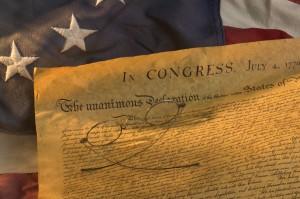 One of the most surprising events in the American founding occurred when the Continental Congress used the word “happiness” in the Declaration of Independence.
One of the most surprising events in the American founding occurred when the Continental Congress used the word “happiness” in the Declaration of Independence.
Up to that point, it was not a word often utilized in great political writings.
Words like “justice,” “liberty,” “property,” “honor,” “power,” “rights” and others were expected in such a document.
But “happiness” was not.
George Washington expressed the American perspective when he said, “the United States came into existence as a nation, and if their citizens should not be completely free and happy, the fault will be entirely their own.”
In this view, a good government protects people’s freedom, and what they do with it is up to them—and determines their happiness.
Still, the very idea that governments are instituted among men to do just this (protect a person’s right to pursue happiness), was a significant thought.
It was certainly not the view of the European aristocrats, who believed that happiness required financial means and the comforts of leisure time and was only meant to be enjoyed by a few.
The American founding generation took a different view.
They believed that happiness was the result of enterprise, and was possible for everyone.
This is a patently American perspective, and it provided a foundation for the whole American freedom experiment.
It is a profound idea.
If happiness is the result of individual actions and choices, then it follows that government’s primary role is to protect the right to act and choose.
Indeed, in such a view, the only purpose of government and law is to keep any person from taking these rights from anyone else—or of enforcing restitution if such protection fails.
This is the proper role of government: to protect inalienable rights (defense), and if this fails to cause restitution (justice).
This was the crux of the American system, the only one that could really be adopted if the goal of government was to protect “life, liberty and the pursuit of happiness.”
In ancient Rome, the Stoics argued that virtue is the cause of happiness, and this same view was promoted by ancient Judaism and early Christianity.
In feudal times, the meaning of happiness switched more to “good fortune,” which took it out of the hands of each individual.
By 1600, however, this was refined to mean “a pleasant and contented mental state.”
The American founding generation added to the meaning of “happiness” with the idea of voluntarily doing important things—from personal morality to economic enterprise, to family relationships, political and military sacrifice, and charitable service.
They also connected these same things to the concept of freedom, thereby forever linking the words “freedom” and ‘happiness.”
This bears repeating, because it is a central foundation of American government, but has been mostly forgotten today.
Specifically, the American founders put forward an amazing new view of government:
The proper role of the government is to protect inalienable rights, and to leave everything else to the people—who will increase or lose their liberty and happiness according to their personal virtue, economic enterprise, family relationships, charitable service, and other voluntary choices.
For the Founders to adopt this view was a remarkable and vitally important turn of world events, and it established a whole new view—and era—of freedom.
To a large extent, we have now lost this view, and our freedoms have decreased with this change.
We now follow the more traditionally European perspective that great changes in society come from the upper class, experts, elections, and government officials and policies.
The Founders disagreed.
They believed that the American Founding was the result of the people, not a few great leaders.
As John Adams responded when someone tried to compliment his role in the founding: “Don’t call me ‘Godlike Adams,’ ‘The Father of His Country,’ ‘The Founder of the American Republic,’ or ‘The Founder of the American Empire.’ These titles belong to no man, but to the American people in general.”
Freedom and happiness are always connected, and they are always up to the regular people, whether they realize it or not.
To the extent that freedom is declining, it is the fault of the regular people.
Our freedoms and happiness are up to us.
If freedom is in decline, we aren’t doing enough.
The good news is that the people have the power to do something about it, no matter how much the experts try to convince us otherwise.
***********************************
 Oliver DeMille is the chairman of the Center for Social Leadership and co-creator of Thomas Jefferson Education.
Oliver DeMille is the chairman of the Center for Social Leadership and co-creator of Thomas Jefferson Education.
He is the author of A Thomas Jefferson Education: Teaching a Generation of Leaders for the 21st Century, and The Coming Aristocracy: Education & the Future of Freedom.
Oliver is dedicated to promoting freedom through leadership education. He and his wife Rachel are raising their eight children in Cedar City, Utah.
Category : Blog &Citizenship &Culture &Featured &Government &History &Leadership &Liberty
A Funny Thing Happened on the Way to Big Government
June 17th, 2013 // 12:01 pm @ Oliver DeMille
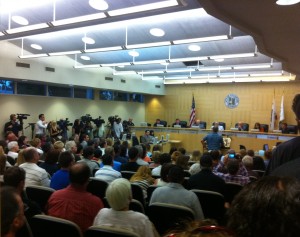 Local government is increasingly the place where things are getting done.
Local government is increasingly the place where things are getting done.
As the party system has created gridlock in Washington, less is getting accomplished on Capitol Hill.
In a funny way, this has created a situation that is more like the American Founding era than anything we’ve experienced in over a century—the real place to get things done in government is at the local and state levels.
The bad news is that Washington continues to spend, borrow, inflate the currency by printing money, and over-regulate in nearly every facet of modern life.
Its growth is slowed by partisan conflicts, but it hasn’t started shrinking.
Not by a long shot.
Another piece of bad news is that the national parties and their teams are pushing their agenda even more vigorously at the local levels.
This means that the party controlling the White House will have a much larger budget and ability to promote national goals in each city, county and state.
The good news is that regular people can have more influence and make more of a difference at the local and even state level.
Most citizens have long felt they can’t really do much to improve Washington—the national government is just too big, too far removed, too immune to change.
But at the local level it’s a different story.
People who really want to get involved can make a major impact on local government.
The key is consistency.
Those who keep at it will eventually learn how to be effective, and as they involve their friends and colleagues they can become a real force for good.
This system, with a lot of citizen involvement at the local level, is what the American founding fathers envisioned.
In a strange way, it is now becoming more of a reality.
As David Brooks wrote in The New York Times, “The happiest people these days are those who leave Washington and get elected mayor or governor. The most frustrated people are people who were mayor and governor and get elected in the Senate. They end each day knowing they were busy. They’re just not sure they accomplished anything.”
Local government is the new power center, and regular people who want to make a real difference can now do so at levels not seen for over a century.
Get involved.
It’s unclear how long this new reality will last, but for now there is a window of power for concerned citizens.
***********************************
 Oliver DeMille is the chairman of the Center for Social Leadership and co-creator of Thomas Jefferson Education.
Oliver DeMille is the chairman of the Center for Social Leadership and co-creator of Thomas Jefferson Education.
He is the author of A Thomas Jefferson Education: Teaching a Generation of Leaders for the 21st Century, and The Coming Aristocracy: Education & the Future of Freedom.
Oliver is dedicated to promoting freedom through leadership education. He and his wife Rachel are raising their eight children in Cedar City, Utah.
Category : Blog &Citizenship &Community &Constitution &Current Events &Featured &Government &Independents &Leadership &Liberty &Mini-Factories &Politics
What is Freedom?
June 17th, 2013 // 10:38 am @ Oliver DeMille
I frequently get asked something along the lines of, “Oliver, you talk a lot about freedom; but what, exactly, do you mean by the word ‘freedom?’ How do you define it?”
It’s a very good question. To answer it, I first want to define “liberty.” After all, the Declaration of Independence boldly affirms that among our inalienable rights are “…life, liberty, and the pursuit of happiness.”
Actually, the key word in this sentence is “inalienable,” and everyone should read the excellent article by Kyle Roberts on what this word really means.
Liberty and freedom are similar, but they are slightly distinct, and understanding them both is essential in a society that is losing its freedoms.
Liberty
As for “liberty,” I define it as “the right to do whatever a person wants as long as it doesn’t violate the inalienable rights of anyone else.” Of course, in order to exercise liberty, a person needs to know what inalienable rights are—otherwise, he won’t know whether or not he is violating them.
Thus knowledge and wisdom are required to maintain one’s liberty, because a person who violates somebody else’s inalienable rights naturally forfeits his own liberty. The extent of this forfeiture is equivalent to the depth of the violation—when this is applied well, it is called justice.
License
License, as opposed to liberty, is defined as “the prerogative to do whatever a person wants or is able to do.” Note that this has often been used in history as an excuse to plunder, force or otherwise violate the rights of others. Thus license and tyranny are nearly always connected—the tyrant is tyrannical precisely because he takes license as he wills, and the person who pursues license eventually exerts tyranny of some kind.
Sometimes people pick one of the inalienable rights and use it to define “liberty,” such as: “Liberty is the right to do whatever a person wants as long as it doesn’t violate the property of another. Or … the life of another, etc. The problem with this type of definition is that though it is often accurate, it is also too limited. The violation of any inalienable right takes away one’s liberty.
Now that we have a definition of “liberty,” we can also define and compare the meaning of “freedom”:
Liberty: The right to do whatever a person wants as long as it doesn’t violate the inalienable rights of anyone else.
Freedom: A societal arrangement that guarantees the right of each person to do whatever he/she wants as long as it doesn’t violate the inalienable rights of anyone else.
“Liberty” comes from the Latin root liber though the French liberte, meaning “free will, freedom to do as one chooses … absence of restraint” (Online Etymology Dictionary). In contrast, the word “freedom” was rooted in the Old English freodom, which meant “state of free will; charter, emancipation, deliverance” (ibid). Thus liberty could exist with or also without government, but freedom was usually a widespread societal system that required some authority to maintain it.
In most eras of history, the goal is liberty, but it is almost never maintained without freedom. In other words, it is possible to have liberty without freedom, but in such cases it seldom lasts very long and it is usually only enjoyed by a limited few.
When freedom is present, however, liberty exists for all who don’t violate the inalienable rights of others.
What About Now?
This trip down memory lane has an important current application. A lot of people want liberty; in fact, nearly everyone desires liberty. But the only duty of liberty is to honor the inalienable rights of everyone else, and as a result liberty without freedom is fleeting.
In contrast, freedom requires many more duties, and therefore it musters much more from its people. It only succeeds when the large majority of people in a society voluntarily fulfill many duties that keep the whole civilization free.
To repeat: those who stand for freedom must honor the inalienable rights of all, and they must also take responsibility for standing up and helping ensure that society succeeds. No truly free government directs this free and voluntary behavior, but without it freedom decreases.
For example, one of the duties of those who support freedom is free enterprise—to take action that improves the society and makes it better. No government should penalize a person who does not do this (such penalties would reduce freedom), but overall freedom will decrease if a person has the potential to take great enterprises that improve the world, but doesn’t.
Thus freedom is very demanding. If people don’t voluntarily do good things, and great things, freedom declines. If they don’t exert their will and take risks to improve the world, freedom stagnates and decreases.
Freedom and Morality
Another way that people voluntarily increase freedom is by choosing morality. In societies where a lot of the people don’t choose a moral life, liberty may be maintained by some people but the freedom of all people eventually declines. When more people choose the path of virtuous living, freedom grows.
The same is true of charity and service. When more people choose it, freedom increases. There are a number of other ways people can voluntarily take actions that have a direct and positive impact on freedom. In the freest societies, a lot of the people choose to engage in many such behaviors.
When we pledge allegiance to the flag, we do so to promote “…liberty and justice for all.” This is the role of government—liberty and justice, or in other words the protection of inalienable rights and the providing of recompense if such rights are violated.
But while in free nations government is limited to this role, the people in a free society must do much more. If they all do their best, fully living up to their potential, freedom greatly increases.
In other words, the real question isn’t “What is freedom?” but rather “What is my role in freedom?”
The answer is different for each person, but the key is to not worry about how other people use their freedom. As long as they aren’t violating inalienable rights, they won’t hurt you. Your focus (and my focus, and each individual’s focus) should be, simply, “Am I living up to my full potential, my great life mission and purpose in this world?”
If your answer to this question is “yes,” you are a promoter of freedom and your efforts and projects will help increase freedom for everyone. If not, now is the time to get started…
Category : event &Featured &Foreign Affairs &Information Age &Liberty &Mini-Factories &Mission &Politics &Statesmanship &Technology &Tribes
Summer Reading for YOU
June 14th, 2013 // 10:56 am @ Oliver DeMille
5 Recommended Books for the Summer
by Oliver DeMille
“Dad, can you read to me more?” Meri asked me.
Surprised, I looked up from my book and responded, “Oh, sure.”
I took the book she was reading and read a chapter aloud to her. When I finished, I handed her the book.
“Thanks, Dad,” she said. “I could have read it myself, but I just love it when you read. I mean, in the winter you read to us a lot, and with all our classes and other activities it seems like I learn a lot from you, and all my other teachers.
“In the summer is when Mom reads to us the most, out on the couch on the porch, but I don’t learn as much from other people, and it seems like you don’t read to us as often.”
Meri walked away with her book, but our little conversation got me thinking. I’ve always taught that winter is the key time for family reading. But I think that summer is the most important time for kids to see their parents reading—mainly because they tend to spend less time on official “schooling” activities and more relaxed time with parents (and observing their parents’ leisure activity choices) during the summer months.
When children and youth see their parents reading a lot, they naturally value reading. When children and youth value reading, they read more.
Our choices during summer to make a huge difference in the education of our kids, and one of the most impactful things a parent can do is set the example of reading. If your kids see you reading books a lot, especially during summer leisure, not only are you filling your bucket of ideas and resources, but the example you set can drastically influence them. Reading is powerful!
On the national scale, all free societies are reading societies, and reading starts in the home!
Here’s a great summer reading list* that I’m following. I’m making sure all my children and youth see me reading these books this summer. And I’m really going deep—by reading with a highlighter and pen, taking notes and marking quotes as I go. I’m sharing these books because I hope you’ll do the same:
The Early History of Rome, by Livy
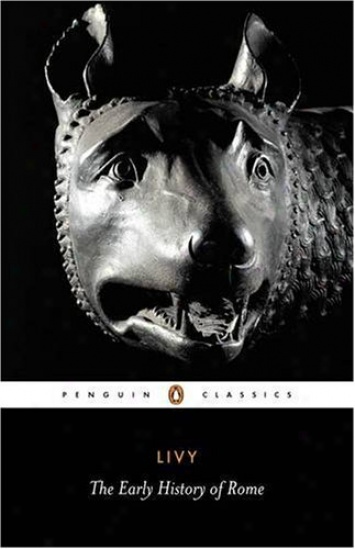 This great book isn’t part of the Great Books of Western Civilization, but it could be. I want my children and youth to see that I care about history, and I’ll look for opportunities to share Livy’s stories with them and talk about the connection between reading history and being successful leaders in life.
This great book isn’t part of the Great Books of Western Civilization, but it could be. I want my children and youth to see that I care about history, and I’ll look for opportunities to share Livy’s stories with them and talk about the connection between reading history and being successful leaders in life.
Rascal, by Chris Brady
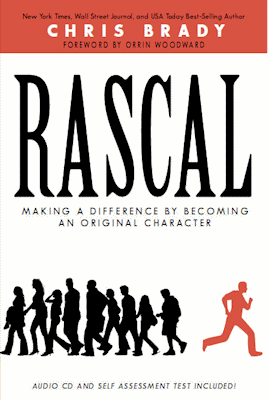 I want my kids to know what a “rascal” is–at least the way Brady defines it. I want them to be the kind of people this book promotes, and I can’t wait for them to ask me about this book.
I want my kids to know what a “rascal” is–at least the way Brady defines it. I want them to be the kind of people this book promotes, and I can’t wait for them to ask me about this book.
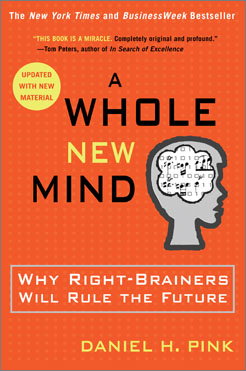 A Whole New Mind, by Daniel Pink
A Whole New Mind, by Daniel Pink
I want my youth to be innovative, creative, and have initiative. This is one of the hardest things to teach, but I’ll look for opportunities to discuss these things as I read this book.
Isaiah, in the Bible
I love sharing scriptural verses with the kids and discussing the meanings and lessons. It leads to a lot of important conversations with the kids about the most important topics.
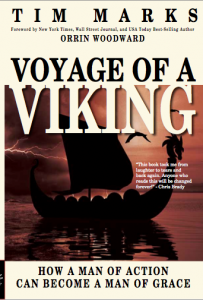 Voyage of a Viking, by Tim Marks
Voyage of a Viking, by Tim Marks
I can’t wait to talk to my kids and youth about this book! It’s about seeking for greatness, learning from your mistakes, not settling for mediocrity, and constantly improving yourself. I know the title of this book will have all my kids asking me questions about it!
Chillin’ and Grillin’
This week I’ve been reading these books in the evenings outside by the grill and the court where the kids play basketball, in the hot afternoons near the swamp cooler, and in the kitchen before meals and during cleanup after the family eats. I’ve taken turns with each book, so I’m a few chapters into all five of them, but I’ve had more than one discussion about each with the kids.
Tonight as dinner started, I got everyone’s attention and said, “I’m reading this awesome book. Actually, I’ve read it before but I’m re-reading it and I want to share something from it that really touched me.”
Everyone quieted down and listened. “Here goes,” I said. Then I read from Voyage of a Viking:
Kids can be pretty relentless in teasing one another, and the kids in my school were no different. I had never before been the subject of teasing and bullying, so it was a new experience for me. You see, news of my parents’ divorce got around town pretty quickly, and it wasn’t too long before the news hit my schoolyard.
The little kids in the family were leaning forward at full attention, and even the teens were paying close attention. I kept reading:
And then the teasing began. ‘There’s Tim, and he doesn’t have a dad,’ the kids would whisper to each other and taunt me.
I stopped reading and asked, “How would that make you feel?”
“I’d hate it!” Meri said forcefully. The other kids agreed.
After they shared their feelings, I asked, “Have you ever been teased like that?” We discussed this for a while, then I asked everyone, “Okay, I have another question. Have you ever teased anyone this way?”
“No way!” Meri exclaimed. She is nothing if not earnest.
“Are you sure?” I asked slowly.
Everyone considered. “Well, actually,” Meri said, then she told several stories of when she wasn’t very nice to people in her life. The other kids shared too, and we had a great conversation about being good friends and also standing up against bullying even when the victim isn’t your friend.
When I read what happened next in the book, everyone got even more interested. You’ve got to read it to get it! We spent dinner talking about this and discussing it.
At the end, I said, “I’m so excited to read the rest of this book.”
“Me too,” America said emphatically. “Meri” is nine years old, and she loves to read. I don’t know when she’ll read Voyage of a Viking, but I’ll be sharing from it and the others on my list all summer.
Actually, I’m having a hard time reading it because after our dinner discussion my visiting twenty-year old daughter Sara borrowed my copy and is reading it. Oh well, she reads fast. In the meantime, I’ve got the other four books.
Tomorrow at breakfast I’m planning to share the following quote from Livy, where he says that he is excited to write about Rome because, as he puts it:
I shall be able to turn my eyes from the troubles which for so long have tormented the modern world.
I’ll ask the family, “Why do you think people always feel that the modern, current world is so chaotic and hard and that the people in history somehow had things more simple? I mean, Livy thought this clear back in the time of Jesus Christ.”
This question is more for the teenagers, while yesterday’s conversation was perhaps more accessible to the younger kids. But everyone takes part in all of it. The older ones (me included!) bear reminding about Core Phase issues, and the younger ones benefit immensely by being including in the discussion of “serious” topics of academic and intellectual interest.
I could go on and on sharing examples of how to do this, but I’ve got a book calling to me. I’ve finished work for the day, and I want to read in the yard this evening—so I’ll be near the kids and we can talk.
Maybe I’ll teach them from one of these five books I’m reading, or maybe Meri will bring me a book of her own to read and talk about. Or perhaps we’ll all just sit in the warm evening and watch the sunset and talk. I often have the stack of all five books around with me, so I can just pick and choose which to read and share.
In any case, I’m excited to keep reading and sharing my book list this summer. This first week has been great. I can’t wait to see what we’ll learn about together in the months ahead.
Summer is a great time for education. So just get out your books, start reading, and share! The impact on freedom is huge.
Also check out Summer Reading for Kids >>
*Most of these books are available at your local library. Or, check the affiliate links to see amazon reviews, etc.
Category : Blog &Book Reviews &Business &Citizenship &Culture &Education &Family &Generations &Independents &Leadership &Liberty &Mission &Statesmanship











